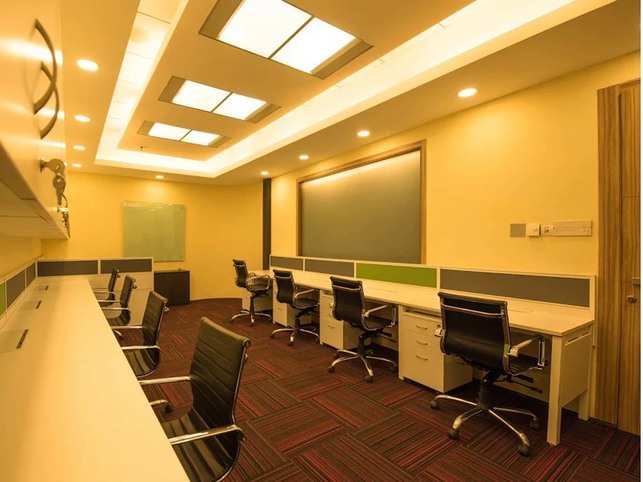Guest Column
Coworking – Workspaces for Indian Millennials


Coworking – Workspaces for Indian Millennials
- Bengaluru, NCR and Mumbai, followed by Hyderabad and Chennai currently offer the best opportunities
- India is the world’s youngest start-up nation with >70% founders less than 35 years of age
Anuj Puri, Chairman – ANAROCK Property Consultants
India has emerged as one of the world’s most-preferred investment markets, thanks to its thriving economy, burgeoning start-up ecosystem, and its ever-deepening talent pool.
With businesses big and small continuing to grow and broaden their horizons, expensive real estate coupled with new-age professional’s desire to work in an aesthetically appealing environment have spurred demand for collaborative workspaces in India.
In fact, the new millennial workforce will accelerate this changing office dynamic further in the years to come. As per statistics, millennials are set to form 50% of the global workforce by 2020 – and India is the youngest start-up nation in the world, with a rapidly-increasing millennial workforce.
This generation is ready to ditch conventional workspaces for more swanky, flexible and cost-effective office spaces that effortlessly embrace the latest technologies into their system. To meet this growing demand, India definitely needs more coworking spaces.
Why Coworking?
For GenX and millennials, offices are no longer places to sit, churn and dawdle – they are environments where they seek to enhance their creativity, network and thus increase the profitability of their companies.
Besides swishy workspaces, tech-savvy millennials also prefer their workstations to be completely technologically equipped – offering hyper-connectivity solutions and state-of-art infrastructure.
Coworking spaces are offering just that. Furthermore, these spaces are proving to be the best alternative for a rising number of freelancers, women employees seeking flexibility, and for those looking to be stationed at prime locales with connectivity and faster commute options.
On their part, companies are aspiring to innovate and tap into this new generation of talent cannot ignore coworking. All types and sizes of firms are now embracing the new reality of employees’ expectations for a technology-enabled style of working. Accordingly, they are ready to alter their workplace strategies.
Moreover, coworking is proving to be cost-efficient by nearly 15-25% by cutting down rental costs, fixed-capital investments and property maintenance.
New Trends in Coworking Spaces
It is no accident that the hype around coworking has continued throughout 2018. Major players actively leased such spaces across the major cities.
Source: ANAROCK Research
There are more than 200 players operating the current stock of more than 420 such workspaces (both branded and non-branded) across the country. This number is likely to increase two to three fold over the next two years alone.
This apart, with office rents rising across India, the total space occupied by co-working spaces is likely to witness at least a 30-40% annual increase. Cities that will offer the best opportunities for this trend include Bengaluru, NCR and Mumbai, followed by Hyderabad and Chennai.
If we delve into the data a little further, some new trends have emerged in 2018:
- All major coworking deals in 2018 happened around the CBD areas of cities. For instance, coworking giant WeWork leased major spaces in key localities across cities, including 1.2 lakh sq. ft. space at Domlur in Bengaluru, 1.9 lakh sq. ft. space at BKC and 2 lakh sq. ft. at Andheri in Mumbai, 2.25 lakh sq. ft. at Cyber City in Gurgaon etc.
- As for property sizes, nearly 30% of the acquisition of coworking spaces in 2018 happened in the size range of 50,000-1 lakh sq. ft., followed by 20% each of those sized between 10,000-50,000 sq. ft. and 1 lakh to 2 lakh sq. ft. area.
- Consolidation of coworking spaces started in 2018 with major acquisitions like One Co.Work acquiring IShareSpace and AltF CoWorking acquiring Noida-based Daftar India.
- In 2018, maximum coworking deals were driven by large PE players and venture capitalists (while in 2017 most of the deals were driven by angel investors and only a few PE players).
Source: ANAROCK Research
All Sizes of Businesses Yield to Coworking Demand
Breaking all conventional norms, even the big daddies of the corporate world are now scouting for more flexible and cost-effective workspaces so as to cater to the evolved needs of their new workforces. They prefer small teams on specific projects to work in a collaborative culture. Those eyeing smaller towns favour satellite offices that are cost-effective and more financially viable.
Besides these, SMEs and start-ups are also boosting demand for coworking spaces. Today, India is witnessing a proliferation of start-ups. NASSCOM estimates show that India will have more than 10,500 start-ups by the end of 2020 and will remain third only to US and UK.
In fact, India is the world’s youngest start-up nation with >70% founders less than 35 years of age. This younger generation of entrepreneurs will keep the coworking ethos alive and sizzling for years to come.
Not Without Challenges
By creating a supportive environment for collaboration and innovative thinking, companies may improve performance – however, coworking can also expose organisations to several risks. For companies dealing with high volumes of confidential data, sharing spaces with external organisations can be potentially risky.
Today, cyber security is a major strategic imperative for organisations, and efficient coworking spaces will need to find ways of mitigating these concerns. From this factor to loss of privacy for their employees, and to imbibing this new work culture for only a select few, companies are grappling with multiple challenges.
The Road Ahead
Despite all the teething issues that coworking spaces face, these ‘cool’ offices will be the global new normal. However, coworking spaces will also need to invent, innovate and re-strategize their business models in order to create win-win situations for all.
For instance, they will need to move away from the current lease-based structure to probably the ownership model developed in partnership with the land owner, developer or even the space provider.
This will offer more flexibility in building a property as per the business needs, reduce costs for clients and enhance flexibility – with the promise of becoming India’s preferred default work ecosystem.
-



 News3 weeks ago
News3 weeks agoKW Delhi 6 Mall Onboards New Brands
-



 News3 weeks ago
News3 weeks agoManasum Senior Living Launches IKIGAI GOA, A Senior Living Community in North Goa, in collaboration with Prescon Homes
-



 News2 weeks ago
News2 weeks agoGodrej Properties Sells Rs 3k cr+ Homes of Godrej Zenith, Gurugram, within 3 days
-



 News3 weeks ago
News3 weeks agoBridging India Divide: Top 5 Tier- 2 Cities to Focus On
-



 News3 weeks ago
News3 weeks agoCommercial Realty Gets Tech Savvy: Fast Construction, Enhanced Convenience
-



 News3 weeks ago
News3 weeks agoMultipoint Connection – A Definite Boon
-





 News2 weeks ago
News2 weeks agoRBI’s Status Quo on Key Policy Rates to Help Maintain the Real Estate Growth Momentum, Say Industry Stalwarts
-



 News3 weeks ago
News3 weeks agoSacred Cities See a Retail Boom as Spiritual Tourism Surge: CBRE Report
























